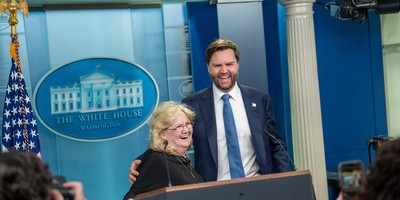WASHINGTON -- Scott Simon -- the sonorous voice of NPR's "Weekend Edition" -- has written a short, tender book about the two most important people in the world. At least to him. "Baby, We Were Meant for Each Other" recounts the arrival of his two daughters, Elise and Lina, from China, while telling the stories of other families changed by adoption.
Simon describes himself as skeptical of transcendence but as taking part in a miracle. "My wife and I," he says, "knew that Elise and Lina were our babies from the moment we received their postage-stamp portraits. Logically, I know that's not possible. But I also know that's how my heart, mind and body ... reacted to their pictures. ... I would take the photo out of my wallet in the weeks before we left to get each of our girls and hold it against my lips to whisper, 'We're coming, baby.'"
It is an unexpected form of human affection -- meeting an unrelated stranger and, within moments, being willing to care for them, even to die for them. The relationship results from a broken bond but creates ties as strong as genetics, stronger than race or tribe. It is a particularly generous kind of parental love that embraces a life one did not give.
International adoption has its critics, who allege a kind of imperialism that robs children of their identity. Simon responds, "We have adopted real, modern little girls, not mere vessels of a culture." Ethnicity is an abstraction -- often an admirable abstraction, but not comparable to the needs of a child living in an orphanage or begging in roving bands. Adopted Chinese girls are refugees from a terrible oppression -- a one-child policy that Simon calls "one of the great crimes of history." Every culture or race is outweighed when the life of a child is placed on the other side of the balance.
Recommended
It is one of the noblest things about America that we care for children of other lands who have been cast aside. Simon recalls his encounter with an immigration officer in Chicago when bringing Elise to America: "'When you cross that line,' he said, 'your little girl is a citizen of the United States.' Then he put one of his huge hands gently under our daughter's chin and smiled. 'Welcome home, sweetheart,' he told her." This welcome to the world is one of the great achievements of history. After millennia of racial and ethnic conflict, resulting in rivers of blood, America declared that bloodlines don't matter, that dignity is found beneath every human disguise. There is no greater embrace of this principle than an American family that looks like the world.
Instead of undermining any culture, international adoption instructs our own. Unlike the thin, quarrelsome multiculturalism of the campus, multiethnic families demonstrate the power of affection over difference. They tend to produce people who may look different from the norm but see themselves as just normal, just human.
Every international adoption involves a strange providence, in which events and choices are random yet decisive. "Those of us who have been adopted," says Simon, "or have adopted or want to adopt children, must believe in a world in which the tumblers of the universe can click in unfathomable ways that deliver strangers into our lives."
When a columnist has a conflict of interest, he should disclose it. My wife, born in South Korea, was adopted by an American family at the age of 6 and welcomed into a Midwestern community. I first saw her when we were both 10, and I have never recovered. Years ago, we visited the orphanage where she lived in Inchon -- orderly, cheerful, but still with dirt floors. The director said she remembered my wife. We were skeptical. But the woman went into a storage room and produced a slip of paper -- the police record relating how On Soon had been found as a newborn abandoned in the market, a note with her name pinned to her blanket.
Life is a procession of miracles, but this one stands out to me. A 6-year-old girl walks off a plane in America, speaking no English, loved by a family she had never met, destined to marry, of all people, me. A series of events that began in a Korean market created my family, my sons, my life. And now my Italian, Jewish, English, Korean boys view themselves as normal, unexceptional Americans. Which they are.
























Join the conversation as a VIP Member